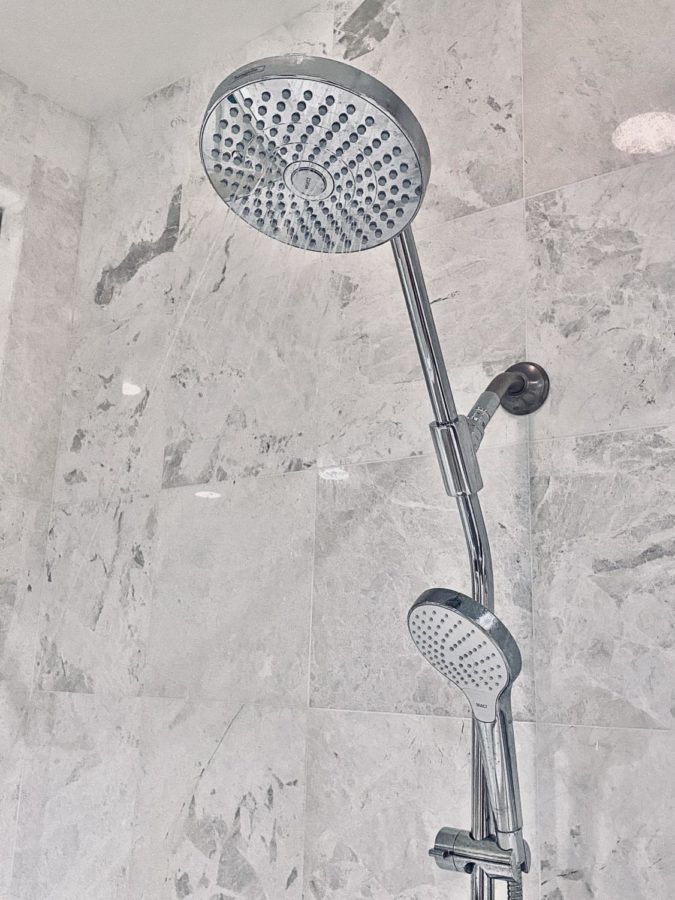When All Else Fails, Take a Shower
Try taking showers at different temperatures at different times of the day to see how that affects you!
June 7, 2022
As a kid, showering might not have been your favorite thing; I mean, why shower just to get dirty again? Whether you like to do it or not, hopefully showering is a frequent occurrence for your sake and for those around you. Besides the apparent impact showering has on your social life (people generally don’t like to be friends with people who smell bad), how and when you choose to shower affects your mentality and whatever you do next.
Before getting into how different factors of showering create different people, we must address showers as a whole. Growing up, we learned that the main purpose of showering is so that you wouldn’t stink or be dirty. Scientifically speaking, this means that taking showers cleans the skin by removing dead skin cells to help clear the pores and allow the skin cells to function (medicalnewstoday.com). However, aside from physical cleanliness, showering can also be a time for mental cleaning; in other words, showering is a time where many can destress, be at peace, think about life, or not think at all (basically an escape from reality). Showering is also an opportunity to put on a full-on concert, because everyone just sounds better singing in the shower.
Although showering supposedly washes away bacteria and other irritants that could cause rashes and other skin problems, it can also have negative effects on the skin. When you shower for too long, you get rid of the natural body oils that protect skin cells, which as a result damages your skin. It is recommended to shower for 5-10 minutes because showering longer than that and more frequently than once a day can lead to itchiness and dry skin. Showering more than once a day is not necessary unless you perform physical activity (people don’t like it when you sweat everywhere) or roll around in the mud. In fact, dermatologists even say that it is best for your skin to only shower every other day, or even two to three times a week (healthline.com).
This leads us to one of the most controversial debates related to showering: what time of day should people shower? This crucial decision has more of an impact on you than you think, and one simple decision can shape how your day and night go. The morning shower vs. night shower debate can definitely get heated, but the truth is there are facts on both sides of the spectrum. The main benefits of showering in the morning is starting the day fresh. Many people use showering as a means to wake themselves up, but showering in the morning has also been shown to put you in a better mood (bustle.com). There have been arguments that showering in the morning defeats the purpose of cleaning yourself of dirtiness throughout the day, but many people actually sweat throughout the night, which means it would make sense to take a morning shower. On the other hand, taking a shower at night makes logical sense because it is the best option for your hygiene, and if you’re taking a warm/hot shower, it improves your sleep quality.
Kimberley-Jeves (11) expresses her thoughts on showering and her personal decisions. She says that “when I shower in the morning, I usually take 10 minutes with warm water,… cold showers are impossible. I would only take cold showers in the morning if I wake up and it’s hot. Also, I play music while I shower because it gets my mood ready for the day. Playing music also covers up my bad singing.” Playing music and singing while taking a warm shower as she describes, sounds like a great way to start the day.
After a long day, it sounds so nice to unwind with a nice, long, hot shower, where you can relax or think about life. Besides it being therapeutic, hot showers provide relief from respiratory symptoms, helps with blemishes, helps with muscle relaxation, opens airways, clears out nasal passages, and improves sleep (especially when taken 1-2 hours before sleeping). Hot showers are known to make you feel more tired after, which will help you sleep better in addition to all your muscles relaxing. However, hot showers can also have negative effects such as drying out and irritating skin. If you have sensitive skin or skin conditions, it is best not to take hot showers because although it feels good, it only worsens the condition of your skin (healthline.com).
Alternatively, you can turn the temperature adjuster all the way to the other side and decide to take a cold shower. If you are not one to take cold showers, which most people aren’t, it might be hard to understand why some people would willingly suffer like that. Well, taking cold showers does not mean ice-bath and may actually feel nice if the weather is very hot or if you just completed strenuous physical activity. Cold showers are good for you because they decrease inflammation, reduce swelling, decrease muscle spasms, have pain-relieving effects, increase metabolism, increase heart rate, increase blood pressure, have potential boosts in weight loss (some fat cells burn fat when exposed to cold conditions like in the shower), and lowers the “stress hormone” (cortisol) that’s in the blood (medicalnewstoday.com). Aside from all these benefits, there is one major con: it’s cold! It is hard to get used to the cold temperature and it probably won’t feel good at first. Also, it is best to not take cold showers when the weather outside is cold or if you are sick because you could catch a cold or get more sick.
Defending the greatly attacked cold showers, Hunaina Hirji (10) shares her experiences with taking cold showers and how “I usually take cold showers after basketball or golf practice for muscle relaxation, recovery, and to get that energy back. I personally do not like hot showers, especially after practice, because they make me feel more sweaty. Even though stepping into a cold shower feels horrible at first, it starts to feel really good after a minute or two.” She also elaborates on why people are quick to dislike cold showers, stating that “you just need to give cold showers a chance, which a lot of people don’t do. You just have to get past the first 15 seconds!”
No matter what temperature and what time of day you usually shower, it doesn’t hurt to try something different and see how that might affect you and your mindset. For example, if you know you have a long day ahead of you, you might want to take a quick cold shower in the morning to wake up and a quick hot shower at night to relax.





































